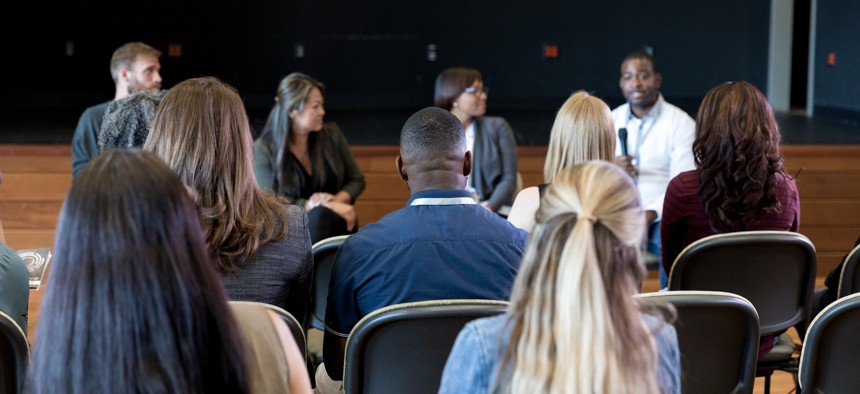Striking the Right Balance Engaging With Residents Online

SDI Productions via Getty Images
A new survey looks at preferences around giving input to local governments virtually, versus in person. It also finds most people don’t recall ever being asked for feedback.
While online public meetings have made engaging with local government easier for some people, others still prefer in-person gatherings, according to a recent report.
A survey, conducted by software company PublicInput, found that 29% of respondents thought in-person public testimony is one of the best ways to share input with their local governments, while only 24% said the same about speaking up during online meetings.
For professionals and elected officials who have grown accustomed to frequent virtual meetings, it can be easy to forget that not everyone is familiar with the format, PublicInput CEO Jay Dawkins told Route Fifty.
It’s important to remember, he added, that participants in local government meetings can include “a very broad array of people from different backgrounds and different comfort levels of tech.”
This appears to show through in the survey results. Thirty-one percent of respondents said they don’t feel comfortable joining virtual meetings, and almost an equal share said they’re not comfortable speaking publicly when they do join.
But that’s not to say online tools have no place in public outreach. More than half of surveyees listed email and online forms as the prime methods for sharing their opinions.
Determining the best mode for gathering public input is only one challenge when it comes to community engagement. Alerting people about opportunities to give feedback in the first place is another. Seventy-one percent of survey respondents claimed their local government had never asked for their opinions on a local policy, project or initiative.
That figure surprised Dawkins, he said, as many organizations have prioritized public engagement, especially during the pandemic. But it likely signals that many people expect their local governments to contact them more frequently about what’s happening in city hall, he said.
“I think that the realization here is that the public's expectations have maybe moved a lot higher, and the bar has been raised a lot more by the public than we anticipated,” he said.
Of the respondents who said the government had asked for their input, 17% said they chose not to respond. Almost half of those respondents said they felt like they didn’t have enough information about the policy, project or initiative in question to share feedback. Other reasons included people not being interested in the topic or believing the issue didn’t affect them.
Even after a local government collects input, “closing the loop” is a critical next step, with nearly 80% of respondents saying they believe they should be informed about how their input was used in decision making.
The survey was conducted in May and June with just over 1,000 respondents from across all states. Of those, 78% said they have participated in a local election in the last decade.
To access the full report, click here.
Molly Bolan is the assistant editor for Route Fifty.
NEXT STORY: Court Fights Begin Over Gun Bans in Places Like Subways and Bars






